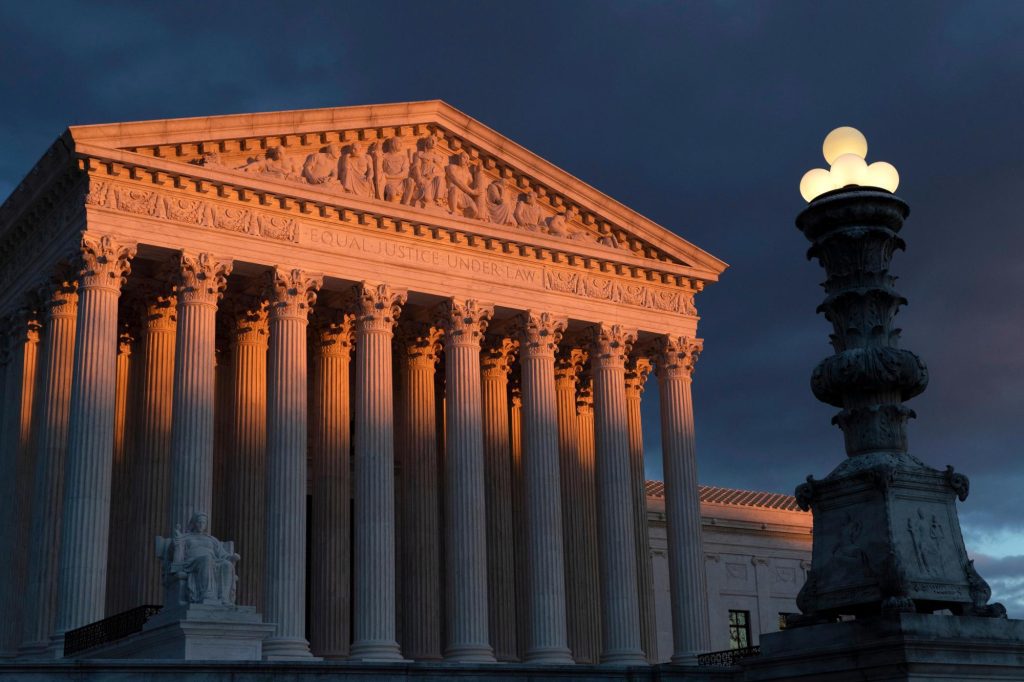By MARK SHERMAN (Associated Press)
The Supreme Court appears to have strong doubts about former President Donald Trump's assertion that he cannot be prosecuted, but it's unclear when a final decision will be reached.
Chief Justice John Roberts, along with at least four other members of the court, seemed likely to reject Trump's claim of immunity that would stop special counsel Jack Smith from prosecuting Trump on charges of conspiring to overturn the 2020 election.
The arguments had been going on for two hours by late morning.
The timing of the Supreme Court's decision is crucial. Trump, the expected 2024 Republican presidential nominee, wants to postpone the trial until after the November election, and the longer the justices take to issue their decision, the more likely he is to succeed.
Justices Neil Gorsuch and Brett Kavanaugh, two of Trump’s three Supreme Court appointees, suggested that former presidents might have some immunity and that lower courts might have to decide whether that applies to Trump. This could further delay a trial.
Justice Amy Coney Barrett, the other Trump appointee, seemed less receptive to arguments put forward by Trump's lawyer D. John Sauer.
Smith's team is seeking a quick decision. The court usually issues its final opinions by the end of June, which is about four months before the election.
Trump, the first former president facing charges, had expressed a desire to be at the Supreme Court on Thursday. However, he was in a New York courtroom, where he is standing trial. standing trial on charges of falsifying business records to conceal damaging information from voters when he ordered hush money payments to a former porn star to keep quiet about their alleged sexual encounter.
Trump's lawyers argue that former presidents should have absolute immunity for their official actions. Otherwise, they contend that politically driven prosecutions of former presidents would become common, and presidents couldn't effectively function as the commander in chief if they had to worry about criminal charges. absolute immunity for their official acts. Otherwise, they say, politically motivated prosecutions of former occupants of the Oval Office would become routine and presidents couldn’t function as the commander in chief if they had to worry about criminal charges.
Lower courts have rejected these arguments, including a unanimous three-judge panel on an appeals court in Washington, D.C.
The election interference conspiracy case brought by Smith in Washington is just one of four criminal cases confronting Trump.
Smith’s team argues that the writers of the Constitution never intended for presidents to be exempt from the law and that, in any case, the actions Trump is accused of – such as participating in a plan to recruit fake electors in battleground states won by Biden – are not part of a president's official duties.
Nearly four years ago, all nine justices rejected Trump’s claim of absolute immunity from a district attorney’s subpoena for his financial records. That case took place during Trump’s presidency, involved a criminal investigation, but resulted in no charges.
Justice Clarence Thomas, who would have blocked the enforcement of the subpoena due to Trump’s duties as president, still turned down Trump’s claim of absolute immunity and referred to the wording of the Constitution and its understanding by those who ratified it.
Thomas stated in 2020 that the Constitution does not give the President complete immunity.
The lack of evident support on the court for the type of absolute immunity Trump wants has led commentators to speculate on why the court has decided to hear the case.
Phillip Bobbitt, a constitutional expert at Columbia University’s law school, expressed concern about the delay, but sees value in a decision that indicates that the government follows laws, not individuals.
The court may also be more concerned about how its decision could impact future presidencies, according to Harvard law school professor Jack Goldsmith.
But Kermit Roosevelt, a law professor at the University of Pennsylvania, stated that the court should not have taken the case because the federal appeals court in Washington, which comprised a variety of ideologies, adequately addressed the issues.
“If it was going to take the case, it should have proceeded faster, because now, it will most likely prevent the trial from being completed before the election,” Roosevelt said. “Even Richard Nixon said that the American people deserve to know whether their president is a crook. The Supreme Court seems to disagree.”
The court has several options for deciding the case. The justices could reject Trump’s arguments and unfreeze the case so that U.S. District Judge Tanya Chutkan can resume trial preparations, which she has indicated may last up to three months.
The court could halt Smith’s prosecution by declaring for the first time that former presidents may not be prosecuted for official acts they took while in office.
It also might detail when former presidents are shielded from prosecution and either declare that Trump’s alleged conduct easily crossed the line or return the case to Chutkan so that she can decide whether Trump should have to stand trial.
___
Follow the AP’s coverage of the U.S. Supreme Court at https://apnews.com/hub/us-supreme-court.









